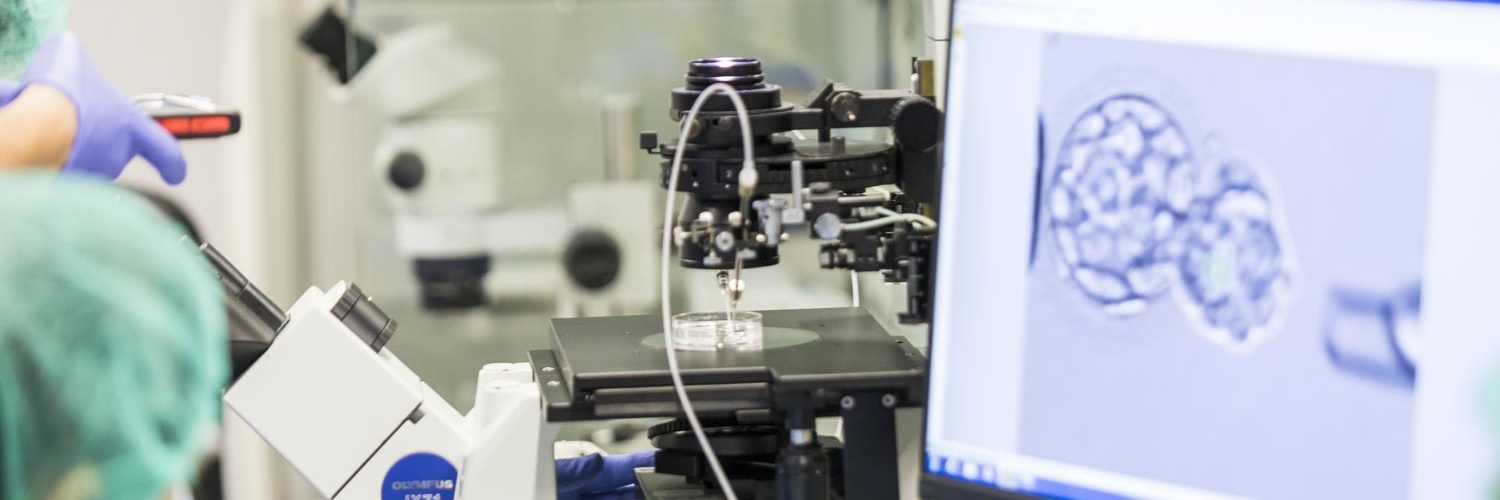
Within the framework of the 38th Congress of the European Society of Human Reproduction and Embryology (ESHRE)
- The embryo and the endometrium are fundamental players in the process of early pregnancy
- In a new study, two doctors from IVI, Dr Juan Antonio García Velasco and Dr Elkin Muñoz, analysed how they factor in recurrent implantation failure and chemical pregnancy
When studying the complex process of early pregnancy development, it is known that both the embryo and the endometrium are two main actors. Doctors Juan Antonio García Velasco and Elkin Muñoz focused their research in examining their the influence in recurrent implantation failure and chemical pregnancy. This research was presented at the 38th Edition of the Congress of the European Society of Human Reproduction and Embryology (ESHRE).
What is implantation failure and what causes it?
Implantation failure occurs when a pregnancy is not achieved after transferring two or more chromosomally normal embryos or four blastocysts. When implantation failure occurs, the first question we ask, as clinicians, is what caused it: was it the endometrium or the embryo? This question has given rise to much research and the emergence of certain hypotheses regarding the role of the endometrium and the role of embryo when implantation is not successful.
Dr. Juan Antonio García Velasco, Chief Scientific Officer of IVI, held an invited session with Merck Group at ESHRE 2022 entitled, “Myths and realities of endometrial receptivity in Assisted Reproduction”. In this session, he outlined the fundamental lines of analysis used to assess the success of assisted reproductive treatments.
“When we talk about recurrent implantation failure, a concept that’s recently been redefined, we understand that in most cases it is the embryo that fails. In this sense, it becomes essential to know what is happening inside the embryo, to go beyond morphology, beyond what we see under the microscope, and study them in depth. Pre-implantation genetic testing for aneuploidy (PGT-A) helps us to confirm whether or not an embryo is chromosomally normal, which causes the vast majority of implantation failures,” explained Dr. García Velasco.
What influences assisted reproduction treatment outcomes?
Fertility clinics study many parameters that contribute to successful treatments outcomes. Some parameters will be fundamental to increase success rates for patients, others to a lesser degree. For example, something as simple as endometrial thickness is clearly connected to treatment success. If the endometrium does not thicken to 6 to 7 millimetres, the chances of success are lowered. But is endometrial transcriptomics still as revolutionary as it was originally?
“There are many receptivity tests on the market and they are very interesting tools. But they do not benefit all patients equally. We have a long way to go to understand which patients have the best results with these techniques. The same is true for new fields of study, such as endometrial and vaginal microbiota and chronic endometritis. These are two attractive and promising areas with wide-ranging perspectives. However, we still have to clarify the diagnostic criteria and, in particular, the profile of patients who will benefit. We also need to confirm that treatments for the abnormalities found really improve a patient’s prognosis”, added Dr García Velasco.
Science is constantly advancing, outlining new horizons that are leading to increasingly accurate diagnoses and personalised treatments. This allows reproductive medicine professionals to ensure their patients achieve their wish to become parents in the shortest time, and with the greatest guarantees. Knowing, choosing and applying the best tools brings them one step closer to this goal everyday.
Causes of chemical pregnancy: embryo or endometrium?
The embryo and the endometrium are fundamental players in the process of early pregnancy. The exact causes of very early pregnancy loss, also known as chemical pregnancy, are still not known with certainty. However, chemical pregnancy has been associated with factors related to age, poor egg or embryo quality, and altered endometrial receptivity.
“Chemical pregnancy is very common in natural reproduction, but even more so in assisted reproduction. It occurs when embryonic development is interrupted after the embryo implants itself into the the mother’s uterus. In a matter of days, the pregnancy stops progressing. It occurs more frequently in the field of assisted reproduction because we monitor pregnancy hormone levels in the blood from an early stage. This means we detect more chemical pregnancies than in natural conception,” explained Dr. Elkin Muñoz, Director of IVI Vigo and IVI A Coruña.
This is the starting point for the study entitled, “Is biochemical pregnancy loss (BPL) associated with embryo or endometrium? A multicentre retrospective study with +7000 cases”, led by Dr. Muñoz. This study was also presented at the 38th Edition of the ESHRE Congress in July 2022.
New research investigating the role of the embryo and the endometrium in chemical pregnancy
“This is a retrospective study with a sample size of more than 7,000 patient cases over 8 years. It resulted in an overall chemical pregnancy rate of 8%. After analysing either the chromosomal content of each embryo or endometrial receptivity, we found no significant reduction in chemical pregnancy rate. It’s essential we learn more about this intrinsic phenomenon that leads to chemical pregnancy in order to advance in its prevention,” concluded Dr. Muñoz.
For this study, the 7,000 patient cases were divided into the following groups:
- Patients whose embryos underwent PGT-A to identify those that were chromosomally normal
- Patients who underwent Endometrial Receptivity Testing (ERA)
- Patients who received both chromosomal and endometrial testing
- Patients who underwent conventional IVF without any additional testing
“Although the chemical pregnancy rate is slightly lower in the group with the highest level of testing (PGT-A and ERA), the differences are not statistically significant. This leads us to conclude that further investigation is essential to illuminate the causes of a still unresolved problem, affecting almost 1 in 10 pregnant women”, concluded Dr. Muñoz.





Comments are closed here.